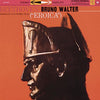





Beethoven – Symphony Eroica - Bruno Walter & The Columbia Symphony Orchestra (200g, Classic Records))
Ludwig Van Beethoven - Symphony No. 3 In E Flat Major, Op. 55 ("Eroica")
Orchestra – Columbia Symphony Orchestra
Conductor – Bruno Walter
1 LP, standard sleeve
Original analog Master tape : YES
Heavy Press : 200g SuperVinyl
Record color : black
Speed : 33 RPM
Size : 12'’
Stereo
Studio
Record Press : RCA Records Pressing Plant, Indianapolis
Label : Classic Records
Original Label : Columbia
Remastered by Bernie Grundman at Bernie Grundman Mastering
Sleeve Notes by Charles Burr
Originally released in 1958
Reissued in 2002
Tracks :
Side A:
- Allegro Con Brio
- Funeral March (Adaglo Assai)
Side B:
- Scherzo (Allegro Vivace)
- Finale (Allegro Molto; Poco Andante)
Reviews:
Classic Records brings us this Eroica reissue on 200g Quiex Super Vinyl Profile. They have transferred the original three-track session master tapes directly to master lacquer on Bernie Grundman's all-tube cutting system. How does it sound? Much cleaner than the set of the complete Walter/CSO Beethoven cycle I bought in the late ‘70s, with abundant detail and a wide dynamic range, but still fairly rough with a good deal of table hiss, the occasional bad edit and the odd spurious noise. I've heard more refined sound from other late '50s material, but I'm grateful to Classic Records for their efforts to make the most of these 47-year-old tapes.
After listening to a few bars, the ear quickly adjusts to the vintage sound. While the instrumental colors may not be absolutely realistic, they are rich and varied, clearly differentiating the various voices. Instead of producing a massive wall of sound, Walter plays the sections of the orchestra off against each other, producing almost a chamber music effect. Each part becomes crystal clear in this complex and groundbreaking symphony. This approach does not reduce the scale or impact of the work. Rather, it serves to illuminate the score, to bring a startling clarity to the music and new understanding to the listener.
There is an integrity in this performance to match the more famous performances of Klemperer and Toscanini, and to wipe out all memory of Karajan. There is no vanity here, no display of burnished string tone, merely an extraordinary attention to the score and a complete understanding of it. I am amazed at Walter's ability to control the smallest details, to start and stop on a dime, to vary the sound pressure within a single note. There is a great deal more flexibility of pace than either Klemperer or Toscanini would allow, and yet his rubato is so well judged that it never draws attention to itself. Klemperer may offer a more powerful and measured approach, Toscanini crisper articulation and a more electrifying approach, but Walter offers power and electricity aplenty. In building to a crescendo Walter may increase the pace a touch, but it is his complete mastery of dynamics that does the heavy lifting. The orchestra responds brilliantly, and maintains its tone production and tight ensemble into the loudest passages, where you can still hear every part clearly.
My listening notes make interesting reading to me now. "You are there!," "every part is clear and necessary," "perfectly judged weight," "not the speed, but the pulse."
It is hard to pick highlights of such a uniformly excellent performance, but the rough grinding of the basses at the start of the Funeral March is most moving, the low strings displaying incredible agility. In the third movement the lightness of touch is remarkable, the performance fast paced, energetic, with the thrust and parry of sword fighting. In the finale, the syncopated rhythms are delicious and the danse macabre is simply a joy.
What is this Columbia Symphony Orchestra, and why is Bruno Walter, already in his eighties, coming out of his retirement to record with them? The story goes that after he retired to California, Columbia executives approached him in 1957 to remake his mono recordings. The new stereo recording system would make the older recordings obsolete. Walter agreed on condition that he be allowed to choose his own musicians. The Columbia Symphony Orchestra was a relatively small orchestra of handpicked session musicians, some of whom rarely played orchestral music, and members of the Los Angeles Philharmonic. Imagine that — a conductor invited to select his own orchestra that no one else would ever conduct!
What would Beethoven have thought of all this? I think he would have been quite excited by Hollywood, and would have gladly written music for the big screen. In his own time he wrote a lot of music for the theatre, and he was always short of money. And he would have been so good at it! As to this recording — I doubt any performance in his own time could have touched it. I also believe he would have been well pleased with Walter's interpretation, just as in the early twentieth century, Gustav Mahler delighted in Walter's performances of his own newly minted symphonies.
This then is a truly wonderful performance. The greatness lies not in the perfection of the playing or the beauty of the sound, but in the realization of the composer's vision. Beethoven set out to change the world in this symphony, and Walter is with him all the way.” Enjoy The Music Review By Phil Gold
Ratings :
Discogs :


